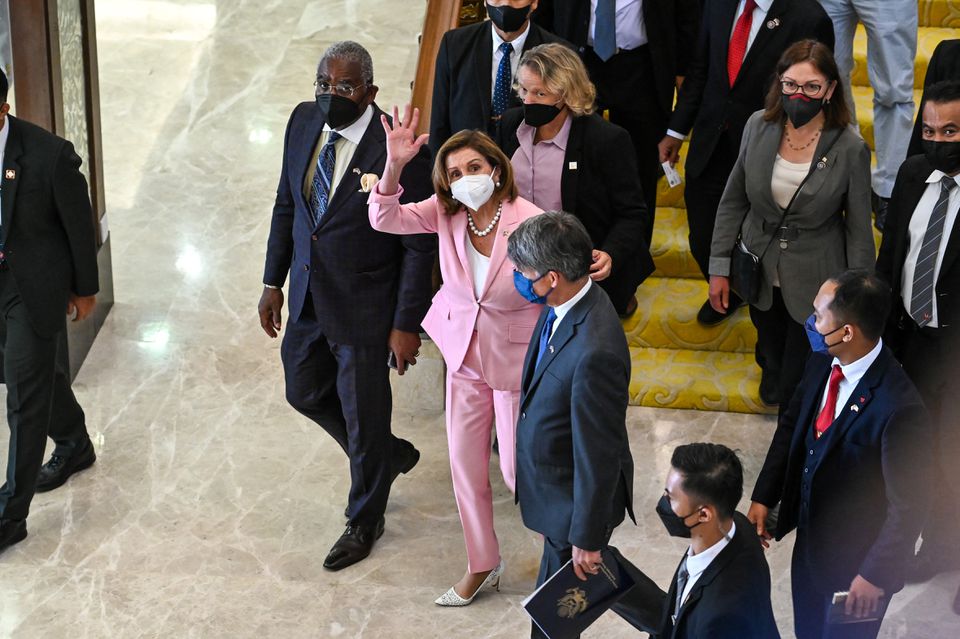U.S. House of Representatives Speaker Nancy Pelosi arrived in Chinese-claimed Taiwan aboard a U.S. military aircraft late on Tuesday, the first such visit in 25 years and one that risks pushing relations between Washington and Beijing to a new low.
Pelosi and her delegation disembarked from a U.S. Air Force transport plan at Songshan Airport in downtown Taipei and were greeted by Taiwan’s foreign minister, Joseph Wu and Sandra Oudkirk, the top U.S. representative in Taiwan.
“Our congressional delegation’s visit to Taiwan honors America’s unwavering commitment to supporting Taiwan’s vibrant democracy,” Pelosi said in a statement shortly after landing. “America’s solidarity with the 23 million people of Taiwan is more important today than ever, as the world faces a choice between autocracy and democracy.”
Pelosi was on a tour of Asia that includes announced visits to Singapore, Malaysia, South Korea and Japan. Her stop in Taiwan had not been announced but had been widely anticipated.
Chinese warplanes buzzed the line dividing the Taiwan Strait on Tuesday before her arrival, as China’s leadership warned against the visit by Pelosi, who is second in the line of succession to the U.S. presidency and a long-time critic of Beijing.
In the latest rhetorical salvo, Chinese Foreign Minister Wang Yi said on Tuesday that U.S. politicians who “play with fire” on the Taiwan issue will “come to no good end”.
The United States said on Monday it would not be intimidated by what it called Chinese “sabre-rattling”.
Most of Pelosi’s planned meetings, including with President Tsai Ing-wen, were scheduled for Wednesday, a person familiar with her itinerary said. Four sources said she was scheduled on Wednesday afternoon to meet a group of activists who are outspoken about China’s human rights record.
Pelosi, 82, is a close ally of U.S. President Joe Biden, both being members of the Democratic Party, and has been a key figure in guiding his legislative agenda through the U.S. Congress.
Taiwan’s foreign ministry said it had no comment on reports of Pelosi’s travel plans, while her office had also kept silent.
On Tuesday night, Taiwan’s tallest building, Taipei 101, lit up with messages including: “Welcome to Taiwan”, “Speaker Pelosi”, “Taiwan (heart) USA”.
With tensions already high, several Chinese warplanes flew close to the median line dividing the Taiwan Strait on Tuesday morning before leaving later in the day, a source told Reuters. Several Chinese warships have also sailed near the unofficial dividing line since Monday and remained there, the source said.
The Chinese aircraft repeatedly conducted tactical moves of briefly “touching” the median line and circling back to the other side of the strait while Taiwanese aircraft were on standby nearby, the person said.
Neither side’s aircraft normally cross the median line.
Four U.S. warships, including the aircraft carrier USS Ronald Reagan, were positioned in waters east of Taiwan on what the U.S. Navy called routine deployments. The carrier had transited the South China Sea and was now in the Philippines Sea, east of Taiwan and the Philippines and south of Japan, a U.S. Navy official told Reuters.
It was operating with the guided missile cruiser USS Antietam and destroyer USS Higgins, with the amphibious assault ship USS Tripoli also in the area.
Since last week, China’s People’s Liberation Army has conducted various exercises, including live-fire drills, in the South China Sea, Yellow Sea and Bohai Sea, in a show of Chinese military might.
China views visits by U.S. officials to Taiwan as sending an encouraging signal to the pro-independence camp on the democratic, self-governed island. Beijing considers Taiwan to be part of its territory and has never renounced using force to bring the island under its control. Taiwan rejects China’s sovereignty claims and says only its people can decide the island’s future.
The United States has no official diplomatic relations with Taiwan but is bound by American law to provide the island with the means to defend itself.





